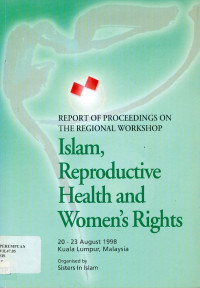
Text
Islam, reproductive health and women's rights: report of proceedings on the regional workshop
The rights of Muslim women to attain a high standard of sexual and reproductive health, make their own decisions regarding marriage, motherhood, contraception and sexuality free of coercion, and to end discrimination and violence are encompassed by the basic principles of Shari’ah. Yet, Muslim women the world over lack the power to express views on sexual relations, child bearing, contraception and other areas of reproductive and sexual health. Muslim women must be able to claim control over these issues as they have a direct impact on the physical, emotional and psychological well-being of women, and consequently on the entire family. Deaths due to pregnancy and childbirth (maternal mortality) remain high, access to safe and legal termination of pregnancies is limited, family planning and contraceptive use is low, and safe, consensual and satisfactory sexual relations continue to elude most women. In addition, domestic violence and sexual coercion contribute to health problems such as the risk of miscarriage and the contraction of STDs and HIV/AIDS. While it is true that most of these problems are common to women from all walks of society, Muslim women are often observed to be further hindered in their quest for claiming rights over their own bodies and their sexuality by alleged religious dictate. Serious discussions on the reproductive and sexual rights of Muslim women are rare and these issues have seldom been analysed within the framework of religion by progressive Muslim scholars, or dealt with in the context of the local situation in Asia. It was in order to address these concerns that Sisters in Islam organised a Southeast Asian workshop on Islam, Reproductive Health and Women's Rights in 1998. The timing of the workshop was occasioned by the concern that the caveat respecting cultural relativity in the International Conference on Population and Development in Cairo in 1994 might reinforce the areas of constraints in the matter of reproductive health and right, and marriage and family in Muslim communities. The goal of the workshop was to put forth progressive understandings of Islamic teachings on reproductive health and women’s rights through an exchange of perspectives, analyses and experiences of scholars and activists working in the area.
Availability
| KP.IX.000001 | ]KP.IX.ANW i | My Library | Available |
| KP.IX.000001-01 | KP.IX ANW i | My Library | Available |
Detail Information
- Series Title
-
-
- Call Number
-
KP.XI ANW i
- Publisher
- Kuala Lumpur : Sisters in Islam., 1998
- Collation
-
vi, 66 hlm.; 29,5 cm
- Language
-
English
- ISBN/ISSN
-
-
- Classification
-
KP.XI
- Content Type
-
-
- Media Type
-
-
- Carrier Type
-
-
- Edition
-
-
- Subject(s)
- Specific Detail Info
-
-
- Statement of Responsibility
-
-
Other version/related
No other version available
File Attachment
Comments
You must be logged in to post a comment
 Computer Science, Information & General Works
Computer Science, Information & General Works  Philosophy & Psychology
Philosophy & Psychology  Religion
Religion  Social Sciences
Social Sciences  Language
Language  Pure Science
Pure Science  Applied Sciences
Applied Sciences  Art & Recreation
Art & Recreation  Literature
Literature  History & Geography
History & Geography